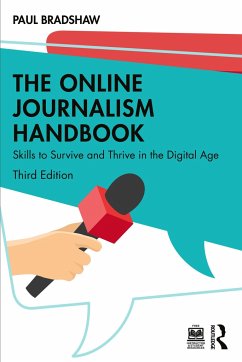
Local Journalism
Critical Perspectives on the Provincial Newspaper
Herausgegeben: Matthews, Rachel; Hodgson, Guy
Versandkostenfrei!
Versandfertig in 6-10 Tagen
154,99 €
inkl. MwSt.

PAYBACK Punkte
77 °P sammeln!
Local Journalism investigates the range of meanings associated with the 'local newspaper' and considers how digital technology has disrupted the fabric of the local news industry.Divided into two parts, this book first provides a theoretical account of how normative meanings associated with the local newspaper have been challenged by the impact of digital technology and then goes on to explore these questions via case studies drawn from a variety of contexts including the US, Ireland, Denmark, the UK and Spain. It suggests three thematic ways of understanding the role of the legacy local newsp...
Local Journalism investigates the range of meanings associated with the 'local newspaper' and considers how digital technology has disrupted the fabric of the local news industry.
Divided into two parts, this book first provides a theoretical account of how normative meanings associated with the local newspaper have been challenged by the impact of digital technology and then goes on to explore these questions via case studies drawn from a variety of contexts including the US, Ireland, Denmark, the UK and Spain. It suggests three thematic ways of understanding the role of the legacy local newspaper in a post-digital environment, namely as an information provider, commercial entity and community champion. While much scholarship talks of their demise, this book argues for a more nuanced understanding of the local newspaper and its continued significance to people, places and commercial interests.
Local Journalism will benefit students, academics and researchers in the areas of journalism, media studies and sociology.
Divided into two parts, this book first provides a theoretical account of how normative meanings associated with the local newspaper have been challenged by the impact of digital technology and then goes on to explore these questions via case studies drawn from a variety of contexts including the US, Ireland, Denmark, the UK and Spain. It suggests three thematic ways of understanding the role of the legacy local newspaper in a post-digital environment, namely as an information provider, commercial entity and community champion. While much scholarship talks of their demise, this book argues for a more nuanced understanding of the local newspaper and its continued significance to people, places and commercial interests.
Local Journalism will benefit students, academics and researchers in the areas of journalism, media studies and sociology.














